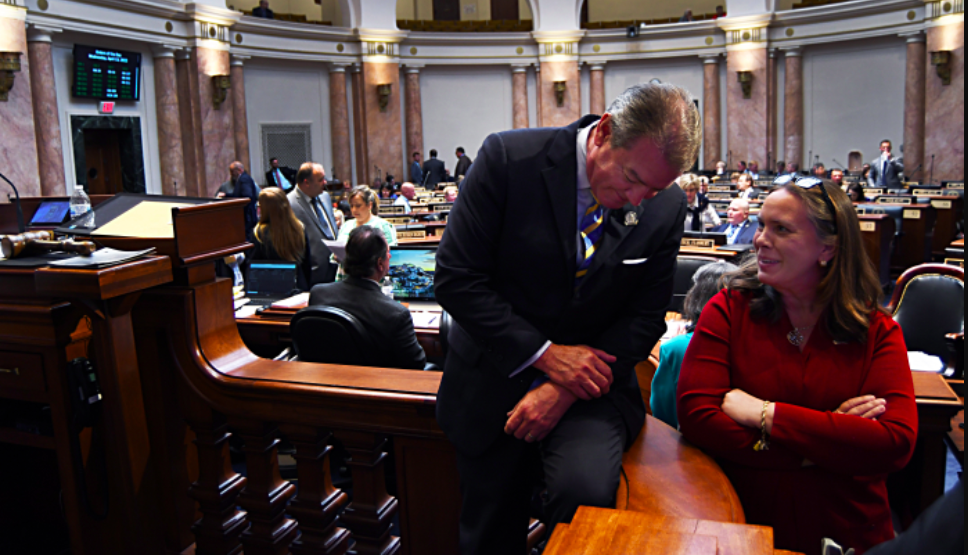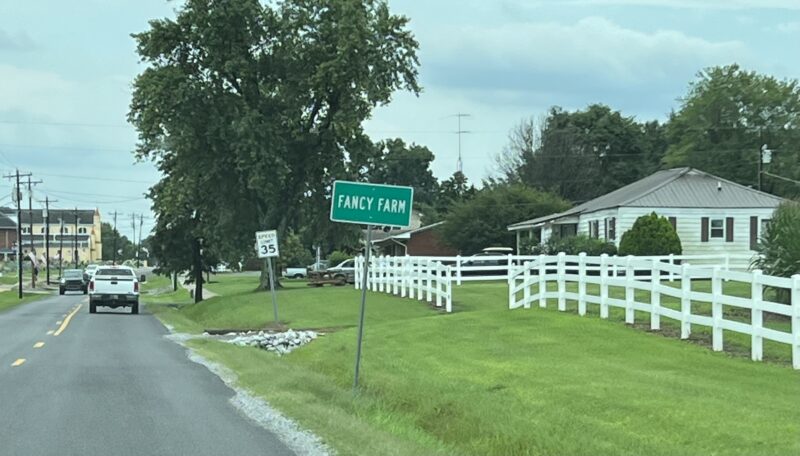Some of the Republican primary candidates seeking the office of the governor are saying they back a constitutional amendment on the ballot that would take powers away from the governor to call a special session.
Auditor Mike Harmon and Attorney General Daniel Cameron say they will vote in favor of Constitutional Amendment 1 on this year’s ballot, even though if they are elected governor the measure would transfer the power to call a special session to the legislature.
Auditor Harmon, who previously served 13 years in the state House, said he thought it made sense to transfer the power to House and Senate leaders.
“I definitely support it, now, if you had asked me five or six years ago I might not have,” he said, alluding to the tenure of the previous Republican governor, Matt Bevin.
Harmon said his position shifted because of the actions of Democratic Gov. Andy Beshear, who is seeking re-election next year.
“He just proved the point that one individual should not be trusted with so much power,” Harmon added of Beshear. “Even with me in that position, I would be supportive. No one person should be entrusted with that power.”
Daniel Cameron’s campaign simply said “yes,” Cameron would support the measure at the ballot box.
Another Republican gubernatorial candidate, Rep. Savannah Maddox, R-Dry Ridge, did not respond to a request for comment, but presumably supports the proposal as she voted in favor of placing the question on the ballot during this year’s legislative session.
Former UN Ambassador Kelly Craft and Agriculture Commissioner Ryan Quarles did not respond to email and text questions from Kentucky Fried Politics about how they will be voting on the measure.
The full text of the Constitutional Amendment is below:
“Are you in favor of amending the present Constitution of Kentucky to repeal sections 36, 42, and 55 and replace those sections with new sections of the Constitution of Kentucky to allow the General Assembly to meet in regular session for thirty legislative days in odd-numbered years, for sixty legislative days in even-numbered years, and for no more than twelve additional days during any calendar year if convened by a Joint Proclamation of the President of the Senate and the Speaker of the House of Representatives, with no session of the General Assembly to extend beyond December 31; and to provide that any act passed by the General Assembly shall become law on July 1 of the year in which it was passed, or ninety days after passage and signature of the Governor, whichever occurs later, or in cases of emergency when approved by the Governor or when it otherwise becomes law under Section 88 of the Constitution?
Proposed New Section
(1) The General Assembly, in odd-numbered years, shall convene in regular session on the first Tuesday following the first Monday in January for the purpose of electing legislative leaders, adopting rules of procedure, organizing committees, and introducing and considering legislation.
(2) No regular session of the General Assembly occurring in odd-numbered years shall continue beyond thirty legislative days.
(3) No bill raising revenue or appropriating funds shall be passed by the General Assembly in a regular session in an odd-numbered year unless it shall be agreed upon by three-fifths of all the members elected to each House.
(4) The General Assembly, in even-numbered years, shall convene in regular session on the first Tuesday following the first Monday in January, and no regular session of the General Assembly in even-numbered years shall extend beyond sixty legislative days.
(5) Except as otherwise provided in this Constitution, the General Assembly shall establish by general law or joint resolution the date the regular session shall end. No bill establishing a later date shall be passed by the General Assembly unless it shall be agreed upon by three-fifths of all the members elected to each House. No session of the General Assembly shall extend beyond December 31.
(6) In addition to a regular session, the General Assembly may be convened by Joint Proclamation of the President of the Senate and the Speaker of the House of Representatives for no more than twelve legislative days annually, during which the General Assembly may recess from time to time as it determines necessary. Should a vacancy occur in the office of the President of the Senate or the Speaker of the House of Representatives, the Joint Proclamation for the House with the vacancy may be issued by the Senate President Pro Tempore or the Speaker Pro Tempore of the House of Representatives.
(7) All sessions of the General Assembly shall be held at the seat of government, except in the case of war, insurrection, or pestilence, when it may, by Joint Proclamation of the President of the Senate and the Speaker of the House of Representatives, assemble, for the time being, elsewhere. Should a vacancy occur in the office of the President of the Senate or the Speaker of the House of Representatives, the Joint Proclamation for the House with the vacancy may be issued by the Senate President Pro Tempore or the Speaker Pro Tempore of the House of Representatives.
(8) Limitations as to the length of any session of the General Assembly shall not apply to any extraordinary session under Section 80 of this Constitution or in the Senate when sitting as a court of impeachment.
(9) A legislative day shall be construed to mean a calendar day, exclusive of Sundays, legal holidays, or any day on which neither House meets.
Proposed New Section
No act, except general appropriation bills, shall become a law until July 1 of the year in which it was passed, or until ninety days after it becomes law under Section 88 of this Constitution, whichever occurs later, except in cases of emergency, when, by the concurrence of a majority of the members elected to each House of the General Assembly, by a yea and nay vote entered upon their journals, an act may become a law when approved by the Governor or when it otherwise becomes a law under Section 88; but the reasons for the emergency that justifies this action must be set out at length in the journal of each House.”




 Login
Login  Must include at least 8 charaters
Must include at least 8 charaters




